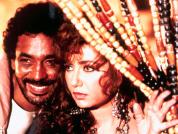
Youssef Chahine
Born in Egypt’s Alexandria in 1926, Youssef Chahine was educated at private schools, including the elite, English-language Victoria College, the city’s pre-eminent high school. He was fascinated by theater and the performing arts at an early age and, still in his teens, Chahine convinced his parents to let him travel to Hollywood to study acting. From 1946 to 1948 he studied at the Pasadena Playhouse outside Los Angeles and, upon returning to Egypt, landed apprentice work with an Italian documentary filmmaker, Gianni Vernuccio, and found another Italian mentor in Alvisi Orfanelli, an influential figure in Egypt's cinema history.
Since the mid-twentieth-century, Cairo ha been known as the Hollywood of the Middle East, and its studios annually produced scores of films that were seen in theaters throughout the Arab world. It was this tradition that Chahine entered when he made his first film, Baba Amine (Father Amine), in 1950. Chahine followed this film with Ibn el Nil (Son of the Nile; 1951) for which he was invited to the Cannes Film festival. In 1958, his reputation as one of the Arab world's most exciting new filmmakers was sealed with the release of Bab el Hadid (Central Station), the story of a lowly newspaper vendor whose love for a co-worker drives him to murder.
Chahine's works have sometimes cast a critical eye on contemporary Egyptian society. With his 1964 work Fajr Yom Jadid (Dawn of a New Day), Chahine depicts Egypt’s widening social stratification between rich and poor. Soon after completion of that project, Chahine entered into voluntary exile in Lebanon and went on to create The Ring Seller (1965), termed one of the best musical comedies of Arab cinema. This he followed with the Lebanese-Egyptian-Spanish co-production Rimal al-Dhahab (Sands of Gold ; 1967), a remake of the bullfighting film Blood and Sand (1922 and 1941). Delays in filming and the eventual box-office failure of Rimal al-Dhahab caused the director to return to Egypt.
After the Six Day War in 1967, Chahine was selected to helm the first Soviet-Egyptian co-production, Al-Nas f'il-Nil (People of the Nile; 1968-1972), about the building of the Aswan Dam. Neither government was pleased with the final results and the film underwent extensive editing before finally being released theatrically in 1972. In the interim, Chahine directed Al-Ard (The Land; 1969), an ambitious adaptation of a popular novel that tied together several of the director's favorite themes of social milieu.
In 1970, Chahine was awarded a Golden Tanit at the Carthage Festival. With Le Moineau (1973), he directed the first Egypt-Algeria co-production. He won a Silver Bear in Berlin for Iskandariya... lih? (Alexandria … Why?; 1978), the first installment in what proved to be an autobiographic trilogy, completed with Haduta Misriya (An Egyptian Story; 1982) and Iskandariya, Kaman ou Kaman (Alexandria Again and Again; 1990).
In 1992, Jacques Lassalle invited him to stage a piece of his choice for Comédie Française: Chahine chose to adapt Albert Camus' Caligula, which proved hugely successful. The same year he began writing El Mohager (The Emigrant,1994), a story inspired by the Biblical character of Joseph, son of Jacob. In 1997, 46 years and 5 invitations later, he was again selected Hors Competition in Cannes with the film Al Massir (Destiny; 1997).
At age 81, Chahine finished his 45th film Heya Fawda (This is Chaos), released in Egypt in early 2008. The film was selected at Venice Film Festival and Toronto International Film Festival. In June of 2008, Chahine suffered a brain hemorrhage. Youssef Chahine passed away in July, 2008.

